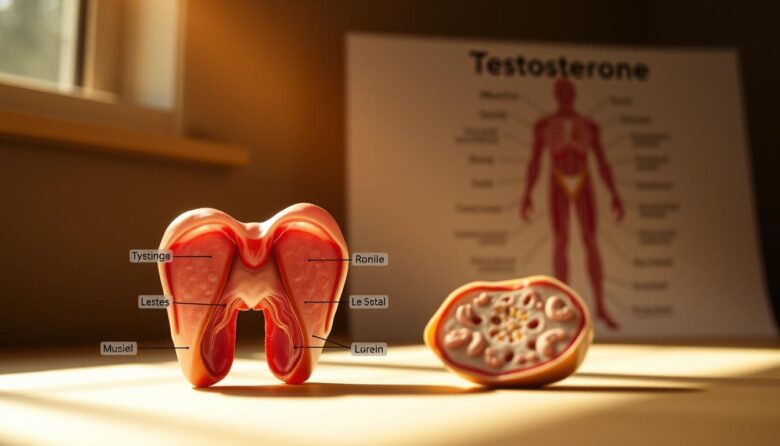As we age, our bodies change in many ways. One important change is the decrease in testosterone. This hormone helps with bone density, muscle, and sex drive. It starts to drop after age 30 or 40.
This drop can cause health problems like low energy and more body fat. Keeping hormone levels balanced is key to staying healthy and feeling good.
Testosterone is not just for sex. It also helps with muscle and bone health. Men can work with doctors to boost their testosterone. This can improve their overall health and energy.
At DietGuru.com, we help men feel their best. We offer the latest advice on testosterone and hormone balance. Men can work with Dr. John Spencer Ellis to enhance their health and energy.
Knowing about testosterone is vital for men’s health. As men get older, their testosterone goes down. This can cause many health problems.
We aim to help men stay healthy with science-backed methods. Our goal is to empower men to manage their health. We provide the tools and resources they need to thrive.
Key Takeaways
- Testosterone plays a vital role in men’s health and wellness
- Testosterone levels drop about 1% a year after age 30 or 40
- Keeping hormone levels balanced is essential for health and vitality
- Testosterone is important for sexual health, bone density, muscle strength, and red blood cell production
- Men can work with health professionals to improve their testosterone levels and overall health
- Dr. John Spencer Ellis can help men improve their aesthetics, sexual health, wellness, and overall energy
- Sign up on DietGuru.com to start your journey to optimal health and wellness
Understanding Testosterone and Men’s Health: A Comprehensive Guide
As we get older, our bodies change in many ways. These changes can affect our health and vitality. Testosterone, a hormone, is key for men’s health. It helps keep muscle, bone density, and sexual health strong.
The Mayo Clinic says testosterone levels drop with age. This can cause symptoms like low libido, tiredness, and mood swings.
A study by Dr. Joel Finkelstein showed testosterone levels vary among men. It also found that testosterone gel can affect the body differently. The study stressed the hormone’s role in keeping bones and muscles strong.
Knowing the signs of testosterone imbalance is important. These signs include:
- Less muscle mass
- More body fat
- Mood changes
- Low libido
Understanding testosterone‘s role in men’s health is key. Being aware of imbalance signs helps men stay healthy and vital with age. Making healthy lifestyle choices and seeking medical help when needed are important steps.
Natural Methods to Optimize Your Testosterone Levels
Men can naturally boost their testosterone by exercising and changing their diet. Doing fitness like strength training and high-intensity workouts helps keep muscle and boosts testosterone. Eating enough protein is also key for hormone balance.
Here are some natural ways to boost testosterone levels:
- Regular exercise, like strength training and high-intensity workouts
- Eating enough protein and foods that help make hormones
- Getting enough sleep, as lack of sleep lowers testosterone
- Managing stress, as too much stress can harm testosterone
Learn more about exercise and hormone production at testosterone therapy and depression. It shows how different things affect each other.

The Connection Between Exercise and Hormone Production
Exercise and hormone production are closely linked. Fitness is key to keeping testosterone levels healthy. The type, intensity, and length of workouts affect testosterone levels.
Strength and resistance training boost testosterone. On the other hand, cardio exercises have less effect. A study showed that high-intensity exercise raises testosterone in untrained people. Adding strength exercises and HIIT to your routine can help testosterone levels.
People with more body fat often have lower testosterone. But, exercise can help. A study found that more physical activity significantly increased testosterone in obese and overweight men. A good fitness plan and healthy lifestyle can improve hormone production.
| Exercise Type | Testosterone Impact |
|---|---|
| Strength and Resistance Training | Increases testosterone levels |
| Cardio Exercises | Less impact on testosterone levels |
| High-Intensity Interval Training (HIIT) | Increases testosterone levels |
Understanding how exercise affects hormones helps us create better fitness plans. A balanced lifestyle, including exercise and a healthy diet, is vital for hormone balance.
Dietary Strategies for Hormone Balance
We think a balanced diet is key for hormone health, including testosterone. Foods high in protein, healthy fats, and complex carbs are great. Research shows we need about 0.8 to 1.2 grams of protein per kilogram of body weight each day.
Some foods help with hormone balance. Lean meats, nuts, and seeds are full of zinc, which is good for testosterone. Whole grains, fiber, and complex carbs help keep blood sugar stable and support fitness. Also, getting enough iodine, found in seafood and iodized salt, is important for thyroid hormones. These hormones affect metabolism and energy.
Here are some dietary strategies to support hormone balance:
- Eat a balanced diet with plenty of fruits, vegetables, and whole grains
- Incorporate lean protein sources, such as lean meats, nuts, and seeds
- Include healthy fats, such as avocado and olive oil, in your diet
- Limit your intake of processed and sugary foods

Lifestyle Factors Affecting Testosterone Production
As we get older, our lifestyle choices can greatly affect our testosterone levels. This hormone is key for men’s health, impacting muscle strength, libido, and mental focus. To keep testosterone levels healthy, we need to think about our sleep, stress, and what we’re exposed to.
Getting enough sleep is critical for testosterone, with not enough sleep leading to lower levels. It’s important to sleep well and deeply. Also, managing stress through meditation or exercise can help keep testosterone levels up.
Exposure to harmful chemicals can also lower testosterone. By being careful about what we’re exposed to, we can support our hormones. This leads to better health and vitality.
By focusing on good sleep, managing stress, and avoiding harmful chemicals, men can support their testosterone. As we age, knowing how lifestyle choices affect testosterone is key. Taking steps to keep testosterone levels healthy is vital for our vitality and well-being.
Dr. Ellis’s Professional Approach to Testosterone Management
As we get older, keeping our hormone balance right is key for staying healthy, mainly for men over 40. A vital hormone to watch is testosterone, which is essential for men’s health. Getting help from a pro like Dr. John Spencer Ellis can offer tailored advice on testosterone care. This helps men see why keeping levels healthy is so important.
Personalized Treatment Plans
These plans are made just for each person, based on their unique needs and health goals. This way, every patient gets the best and safest treatment for their specific issue. This could be through lifestyle changes, supplements, or medical treatments. Plus,
Monitoring and Adjusting Progress
Keeping an eye on how things are going is key. It lets doctors tweak the treatment plan if needed to get the best results.
By focusing on testosterone and hormone balance, men can take charge of their health. This way, they can tackle problems early on. With the right help and support, men can stay healthy and enjoy life fully.
Conclusion: Taking Control of Your Hormonal Health
Keeping testosterone levels healthy is key for men’s health as they age. Understanding how hormone balance changes and knowing when it’s off helps men stay fit and feel great. This is true at every life stage.
Men can improve their health by making lifestyle changes or getting help from a doctor like Dr. John Spencer Ellis. They can tackle hormonal issues and boost their sexual health, energy, and life quality.
It’s important to tackle hormonal health with a well-rounded, science-backed plan. By using the tips from this guide, men can balance their testosterone and reach their wellness goals. With the right information and support, they can make smart choices for their health and wellbeing.










